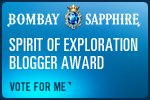Science fiction writer Arthur C. Clarke has died. All through the day today, my thoughts kept returning to him and his influence on my life.
On a winter weekend day in 1968, when I was ten years old, my father packed the whole family into the station wagon and drove us to a movie theater in downtown Milwaukee to see 2001: A Space Odyssey. It was shown on a giant curved screen that made you feel like you were inside the movie. I don't think my father knew what to expect, taking my mother, my younger siblings and me to what is a serious adult film. Even he didn't know what to make of the loud psychedelic scene near the end when astronaut Dave Bowman is hurtling along at tremendous speed in his space pod one second and then has suddenly landed in a large beige-colored bedroom the next. I didn't understand it either, but it changed the way I thought about the future: Boy, are things ever going to be different in 33 years!
I saw 2001 again a few years later with my friend Mark Wiars at the Tosa Theater, just the two of us. We both thought it was cool as heck but we still didn't get it. What was up with the obelisk? Was the one the pre-humans encountered the same one the astronauts found on the moon and then later floating in space? It never occurred to me that there might be a book based on the movie's screenplay until I saw it in my high school library. It answered all my questions and got me hooked on science fiction.
My friend John Shepherd was reading lots of science fiction at that time, but I couldn't get into some of it because it was too fantastic and implausible. I was more interested in stories that followed the laws of physics and yet imagined wild futures full of extra-terrestrial encounters and technological marvels, which is exactly what Arthur C. Clarke provided in his "hard" science fiction. To this day, I am much more interested in seeing a movie like Alien than I am in seeing Star Wars. Over the years, I have read almost all of Arthur C. Clarke's fiction. Most recently I read a collection of short stories that included The Sentinel, which was first published in 1951 and was the inspiration for 2001: A Space Odyssey.
In 1983, when I bought my first computer, a Commodore 64, it included a built-in version of the BASIC programming language. I had struggled with FORTRAN in engineering school, but BASIC clicked for me. I started writing programs to balance my checkbook, calculate pi, wake me up in the morning and do all sorts of other pretty worthless things. Then a friend gave me a printout of the code for ELIZA, the artificial intelligence program written in 1966 by Joseph Weizenbaum, who died earlier this month. The program is designed to respond intelligently to the user's input, simulating a conversation between the user and the computer. It took several nights, but I transcribed the entire thing into my computer and started playing around with it. The program reminded me immediately of HAL, the mutinous computer from 2001, so I rewrote it with HAL's personality. If it couldn't come up with an appropriate response, it would say things like, "Dave, my mind is going..." or "I'm afraid I can't do that."
What I discovered by working with these programs was that I had a knack for computers and programming. They made sense to me. So I pursued a career in information technology that started back in 1985 and continues to the present. I am currently the Database/Internet Administrator for Aspen Valley Hospital. In a way, I owe it to Arthur C. Clarke for opening my eyes to a future where anything, within the confines of science, is possible. Thank you, Mr. Clarke.
This blog is an account of the pursuit of a dream, to sail around the world. It is named after the sailboat that will fulfill that dream one day, Whispering Jesse. If you share the dream, please join me and we'll take the journey together.
For Charlie and Scout
For Charlie and Scout
About Me

- John Lichty
- Savannah,
Georgia, USA
"Go confidently in the direction of your dreams. Live the life you have imagined." --Henry David Thoreau
 Raising Charlie: The Lessons of a Perfect Dog by John Lichty
Raising Charlie: The Lessons of a Perfect Dog by John Lichty
Blog Archive
Followers

Recommended Links
- ATN Sailing Equipment
- ActiveCaptain
- BoatU.S.
- Coconut Grove Sailing Club
- Doyle Sails - Fort Lauderdale
- El Milagro Marina
- John Kretschmer Sailing
- John Vigor's Blog
- Leap Notes
- Noonsite.com
- Notes From Paradise
- Pam Wall, Cruising Consultant
- Practical Sailor
- Project Bluesphere
- Sail Makai
- So Many Beaches
- Windfinder
Thursday, March 20, 2008
Subscribe to:
Post Comments (Atom)




1 comment:
prof premraj pushpakaran writes — 2017 marks the 100th year of Arthur Charles Clarke!!!
Post a Comment